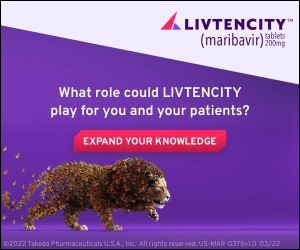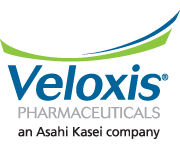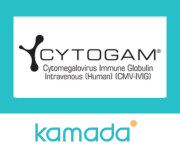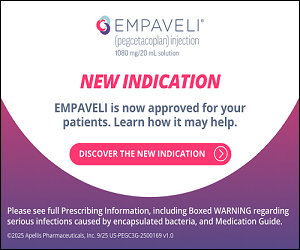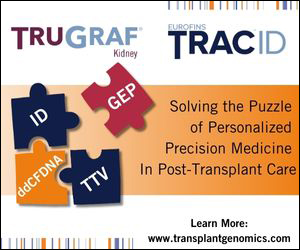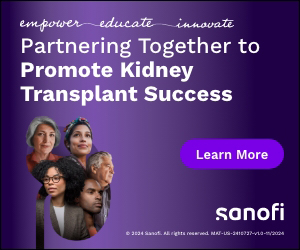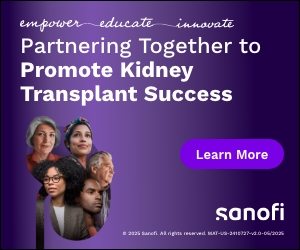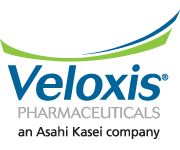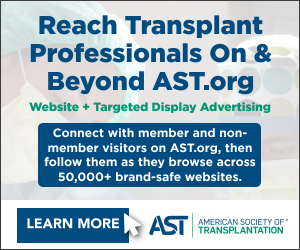 |
|||||||||||||||||||||||||||||||||||||||||||||||||||||
| Past Issues | Subscribe | Advertise | myAST.org | |||||||||||||||||||||||||||||||||||||||||||||||||||||
Important Dates
AST News
Fellows Symposium on Transplantation
Know an early-career professional or student interested in transplantation? Encourage them to check out the AST Fellows Symposium! This unique program offers expert-led sessions and valuable networking with leaders in the field. It’s a great opportunity for fellows, residents, pharmacists, nurses, and students to explore career paths in transplant and build lasting connections.
Win a Napa Valley Experience, Gift Cards + AST Swag Bag!
We're excited to launch a special giveaway supporting the Fellows Symposium on Transplantation! Each year, the AST empowers the next generation of transplant professionals through travel grants, making this essential educational experience accessible to emerging talent.
How to Enter
Now through September 18: Every $10 donation to Fund a Fellow = 1 entry to win our incredible prize package! Donate $100 and you’ll receive 12 entries (2 bonus entries!).
Prize Package Includes:
Your contribution directly funds travel opportunities for the transplant professionals who will lead our field tomorrow.
Registration Open for International Transplantation Science 2025
On behalf of the AST, the European Society for Organ Transplantation (ESOT), and The Transplantation Society (TTS), we are excited to announce that registration is officially open for the International Transplantation Science Meeting 2025.
ITS 2025 marks the fourth tri-society event in this global collaboration, bringing together top experts, early-career researchers, and transplant professionals worldwide. This meeting offers an exciting forum to explore cutting-edge basic and translational science in and beyond the field of transplantation.
A Message from AST’s New President
The AST is proud to welcome Dr. David Foley as our new President. In his first message to the membership, Dr. Foley reflects on the Society’s progress, the important changes shaping our field, and the priorities he will champion in the year ahead.
Read Dr. Foley’s full message to learn more about the vision and initiatives guiding the AST in the year ahead.
Transplant Community Survey on the Pre-Transplant Mortality Ratio Metric
This "Understanding the Impact of the Pre-Transplant Mortality Ratio Metric Implementation" survey focuses on how transplant professionals perceive and respond to the recently implemented pre-transplant mortality ratio metric by UNOS. The goal is to assess how the metric has influenced transplant center practices, particularly in patient listing and organ utilization.
Updates on Efforts and Resources Related to Transplant Nephrology Training
In fall 2024, the ACGME approved the application from the joint ASN-AST Task Force to recognize transplant nephrology as an accredited subspecialty of nephrology. By supporting a broad and nationwide adoption of uniformly rigorous transplant nephrology training, ASN and AST hope to improve the quality of care provided to patients in both the pre-and post-transplant phases.
A webpage has been created to share ongoing updates and resources related to this new accreditation.
New AJT Article: Transplant Recipients Share Perspectives on Immunosuppressant Needs
Last year, with your support, AST conducted a national patient survey that received nearly 10,000 responses from transplant recipients. The goal: to better understand perceptions of unmet immunosuppressant needs. The findings from this important research have now been published in the American Journal of Transplantation.
Share Your Perspective: Transplant Access and the Criminal Justice System
The AST Psychosocial and Ethics COP (PSECOP) is conducting a short survey to better understand transplant professionals’ perspectives on transplantation for patients who are incarcerated or involved in the criminal justice system. The results will help inform future policies and practices to improve care for this population.
The survey takes just 5–10 minutes to complete and is open to transplant professionals (coordinators, social workers, ILDAs, physicians, etc.) currently working at a U.S. transplant center. Please feel free to share the link with colleagues.
Questions? Contact the research team at emorytransplantresearch@emory.edu or reach out to Principal Investigator Megan Urbanski, PhD, MSW at megan.urbanski@emory.edu. This study has been approved by the Emory University Institutional Review Board.
AST Public Policy Form
The AST developed a survey aimed at soliciting your perspectives on legislative and regulatory issues that significantly influence both patient care and professional practice. Our goal is to establish a platform for our membership to share their invaluable ideas and perspectives and actively engage with the Public Policy Committee and AST leadership. We look forward to your input as we navigate the dynamics of our ever-evolving landscape of transplant care and practice.
Upcoming Education
Key Articles in Transplantation
En Bloc Heart-Lung Transplantation: Past and Present. A Systematic Review
Source: onlinelibrary.wiley.com
En bloc heart-lung transplantation (HLTx) has been utilized for the past 50 years for the treatment of end-stage heart and lung disease, with significant evolution in the field over that time. This is a systematic review of HLTx and a description of the evolution and outcomes in this patient population. United States Trends in Procurement of Solid Organs Intended for Research
Source: onlinelibrary.wiley.com
Among 107,485 deceased organ donors across 58 organ procurement organizations (OPOs), organs recovered for research included 2491 intestines, 6494 hearts, 6627 livers, 9098 kidneys, 10,711 pancreata, and 13,025 lungs. Research organ recovery showed an upward trend, particularly for pancreata. Median percentage of organ recovery for research across the OPOs, varied significantly by organ type: intestines (65.4%), pancreata (36.1%), lungs (28.3%), heart (11.3%), liver (7.1%), and kidneys (3.8%), with no significant correlation between OPO donor organ volumes and research organ recovery rates. Analysis of the 2021 data showed a higher median percentage of research organ recovery in Tier 1 OPOs (13.8%) compared to Tier 2 (10.8%) and Tier 3 (11.4%), though these differences were not statistically significant (p = 0.18).
Postoperative Infections and Antimicrobial Prophylaxis in the Pediatric Intensive Care Unit After Liver Transplantation in Children
Source: onlinelibrary.wiley.com
This is a multicenter, retrospective cohort study of isolated pediatric LT recipients from 12 LT centers in the United States over 2 years. Pre- and postoperative variables were examined to determine POI risk factors during the PICU admission. Antimicrobial prophylaxis utilization was assessed. Comparative statistics were performed using chi-squared and Mann–Whitney U tests. Multivariable logistic regression modeling evaluated POI risk factors.
Racial and Sex Disparities in US Kidney Transplant Clinical Trials: A Comparative Analysis With National Transplant Registry Data
Source: Journal of Surgical Research
Chronic kidney disease and kidney failure disproportionately affect racial and ethnic minorities in the United States, yet these populations remain underrepresented in clinical trials, especially in kidney transplantation research. The objective of this study was to analyze the representation of racial, ethnic, and sex groups in US-based kidney transplant clinical trials and assess whether participant demographics reflect the population receiving transplants, using national registry data.
|
|||||||||||||||||||||||||||||||||||||||||||||||||||||

